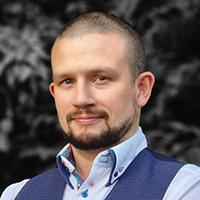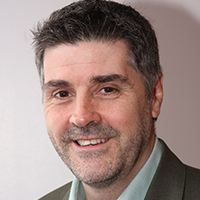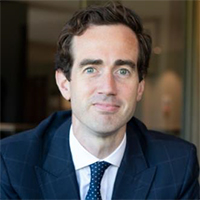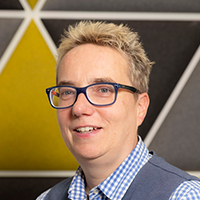The USP Competency Framework – Ground Breaking Safety: Preventing Damage and Harm, through ensuring Competency at every level.
 In recognition for his work in reducing the risk of underground service strikes, Dave McPherson was named as the winner of the Safety and Health Excellence Awards Rising Star, and SHP Award for Trailblazer in Health & Safety for 2021.
In recognition for his work in reducing the risk of underground service strikes, Dave McPherson was named as the winner of the Safety and Health Excellence Awards Rising Star, and SHP Award for Trailblazer in Health & Safety for 2021.
As the Founder and Project Lead of the USP Competency Framework, Dave is passionate about making sure that everyone can perform their role safely and effectively, which includes ensuring that we all have access to the right level of support, resources and training to break ground with confidence.
Dave started this work after having lead an investigation into a service strike, which resulted in uncovering a broad range of problems. The most significant finding was that these challenges appeared to be well documented as universal for all who have to break ground as part of their business; from Inaccurate drawings, to improper equipment selection and use, through to what was often cited as ‘Behavioural’ causes, Dave’s hypothesis was that there is a lack of consistency in the standards required in the industry, and that to solve this challenge would require significant improvements in the way roles, responsibilities and competency was managed.
To address this, Dave built a team of leading experts from a wide range of disciplines – from Specialist Training providers, equipment manufacturers, subject matter experts, industry leaders, human factors experts and World class academics in civil engineering, ensuring that each aspect of the challenge is represented effectively.
Dave will talk through the project so far, and what is in store for the future of Competency, in Underground Service Protection.
 Tim’s first work as a qualified psychologist was looking at soldier suicide in the UK army. His recent work in mental health and wellbeing means that his career has come full circle 30 years later.
Tim’s first work as a qualified psychologist was looking at soldier suicide in the UK army. His recent work in mental health and wellbeing means that his career has come full circle 30 years later.
Following this he was one of the team leaders of the original UK research into behavioural safety (in construction) in the early 1990s He is considered a world authority on the subject of behavioural safety, safety leadership and organisational culture, was awarded a “President’s Commendation” in 2008 by the International Institute of Risk and Safety Management and was selected to be their first ever ‘Specialist Fellow’ in 2010. He was made visiting Professor at Plymouth University in 2015.
He has given key note talks around the world including the closing key note at the inaugural Campbell Institute ‘International Thought Leaders’ conference (Dallas, USA, 2014 as well as key note talks at major conferences in South Africa, New Zealand, Asia, India and the Middle East. In 2016 he was the key note speaker at the inaugural NEBOSH Alumni event.
Founder of Ryder Marsh Safety he has worked commercially with more than 500 major organisations around the world, including many international oil and gas, utility, chemical, transport, IT and manufacturing organisations as well as the European Space Agency, the BBC, the National Theatre and Sky. Founded Anker & Marsh in 2018 with Jason Anker to focus more closely on wellbeing and mental health issues.
His work as an expert witness includes the Cullen Inquiry into the Ladbroke Grove train crash (Definition of Culture; Changing Culture) as well as with many law firms.
He has worked with media such as the BBC (radio work and selecting and fronting a box set of their “disaster” series) and has written and produced many training videos such as “Drive Smarter” and the extensive “Safety Leadership” series with Baker-media and ‘Crash Course’ (a commercial spin off of the Staffordshire Police speed and safe driving awareness course). He features in “There’s Always a Reason” and “Safety Watch”.
He has written dozens of magazine articles, many academic articles and the books “Affective Safety Management”, “Talking Safety”, “Total Safety Culture”, “Safety Savvy”, “A Definitive Guide to Behavioural Safety” and “A Handbook of Organised Wellbeing”.
“Talking Health Safety and Wellbeing – Building an Empowering Culture in a Post Covid World” published in October 2021.
 Richard is a highly driven and motivated individual committed to developing the safety and efficiency of the UK utility industry. His work includes learning from international best practice and efficiencies, specialising in technological mapping solutions.
Richard is a highly driven and motivated individual committed to developing the safety and efficiency of the UK utility industry. His work includes learning from international best practice and efficiencies, specialising in technological mapping solutions.
He is the Managing Director of the LSBUD (Linesearch BeforeUdig) service in Great Britain helping protect over 120 asset owners’ networks by managing over 3.75 million third party enquiries per annum. The service, based on the One Call principle, now protects over 1,000,000km of assets across various sectors, from buried high pressure fuel pipelines less than 100km in length to electricity distribution networks covering hundreds of thousands of kilometres.
His role includes consultation and networking with a wide variety of utility asset owners as well as all types of third parties from Statutory Undertakers to private individuals and Government organisations. Duties involve business development, marketing and industry awareness, networking and technological development.
Richard is a fully qualified Chartered Surveyor, with experience across a variety of utility and property projects, including cross-country high-pressure fuel pipeline management dealing with a wide variety of third party works and major projects. Previous awards include the Pipeline Industries Guild Sir John Parker Presentation Competition and the National Joint Utilities Group Award for Avoiding Damage to Underground Assets. He leads the Data & Reporting Group of the Utility Strike Avoidance Group, producing the annual Utility Strike Report and increasing awareness of utility strikes across the UK.
 Nicole Metje is the Head of Enterprise, Engagement and Impact and Head of the Power and Infrastructure Research Group within the School of Engineering, and the Director for the UKCRIC National Buried Infrastructure Facility at Birmingham.
Nicole Metje is the Head of Enterprise, Engagement and Impact and Head of the Power and Infrastructure Research Group within the School of Engineering, and the Director for the UKCRIC National Buried Infrastructure Facility at Birmingham.
Nicole is an international leader in the development and application of sensors for (buried) infrastructure assessment and monitoring. She delivers demonstrable impact through industry and policy engagement –bringing international recognition. She leads the Geophysics work package for the Birmingham led Quantum Technologies (QT) Hub for Sensors and Timing , which focuses on the application of QT gravity sensors for a range of applications including as buried pipes, capped mine shafts, sinkholes, monitoring of water levels and carbon sequestration. In parallel, Nicole works with industry on several Innovate UK funded projects to accelerate the development of QT gravity gradiometers, and develop market pull for different civil engineering applications such as railway assets, mine workings and leakage through earthworks.
The QT Hub’s Birmingham Heroes campaign was launched in November 2017. The campaign showcases the pioneering research that takes place at Birmingham, and how it impacts on the lives of people regionally, nationally and globally.
Nicole’s research vision is to significantly advance our fundamental understanding of geophysical soil properties, coupled with the development of novel sensors and sensor applications to radically change the perception of the ground, and the buried infrastructure from a hazard to a resource and an opportunity.
Nicole has published 58 journal papers, as well as over 50 refereed conference papers in the field of geotechnical engineering, infrastructure monitoring, sensor development and coastal engineering. She is the co-author of a book introducing tunnel construction to MSc and MEng students or earlier career engineers.
Nicole is regularly invited to speak on behalf of industry with respect to underground space, utility detection and avoidance of utility strikes. Her national and international reputation is evidenced by invited memberships to the American Society of Civil Engineers (ASCE) utility standards committee, the US Transportation Research Board committee on utilities, BSI’s PAS128 & PAS256 steering committees for utility detection and data sharing, the Institution of Civil Engineers (ICE) Municipal Expert and Geospatial Engineering Panels, the Chartered Institution of Civil Engineering Surveyors’ Utilities and Subsurface Mapping Panel, the advisory committee for the Geospatial Commission’s National Underground Asset Register and the international advisory board (three members) for Hong Kong’s Poly work on the development of ‘Specifications for non-destructive testing’.


 In recognition for his work in reducing the risk of underground service strikes, Dave McPherson was named as the winner of the Safety and Health Excellence Awards Rising Star, and SHP Award for Trailblazer in Health & Safety for 2021.
In recognition for his work in reducing the risk of underground service strikes, Dave McPherson was named as the winner of the Safety and Health Excellence Awards Rising Star, and SHP Award for Trailblazer in Health & Safety for 2021. Tim’s first work as a qualified psychologist was looking at soldier suicide in the UK army. His recent work in mental health and wellbeing means that his career has come full circle 30 years later.
Tim’s first work as a qualified psychologist was looking at soldier suicide in the UK army. His recent work in mental health and wellbeing means that his career has come full circle 30 years later. Richard is a highly driven and motivated individual committed to developing the safety and efficiency of the UK utility industry. His work includes learning from international best practice and efficiencies, specialising in technological mapping solutions.
Richard is a highly driven and motivated individual committed to developing the safety and efficiency of the UK utility industry. His work includes learning from international best practice and efficiencies, specialising in technological mapping solutions. Nicole Metje is the Head of Enterprise, Engagement and Impact and Head of the Power and Infrastructure Research Group within the School of Engineering, and the Director for the UKCRIC National Buried Infrastructure Facility at Birmingham.
Nicole Metje is the Head of Enterprise, Engagement and Impact and Head of the Power and Infrastructure Research Group within the School of Engineering, and the Director for the UKCRIC National Buried Infrastructure Facility at Birmingham.